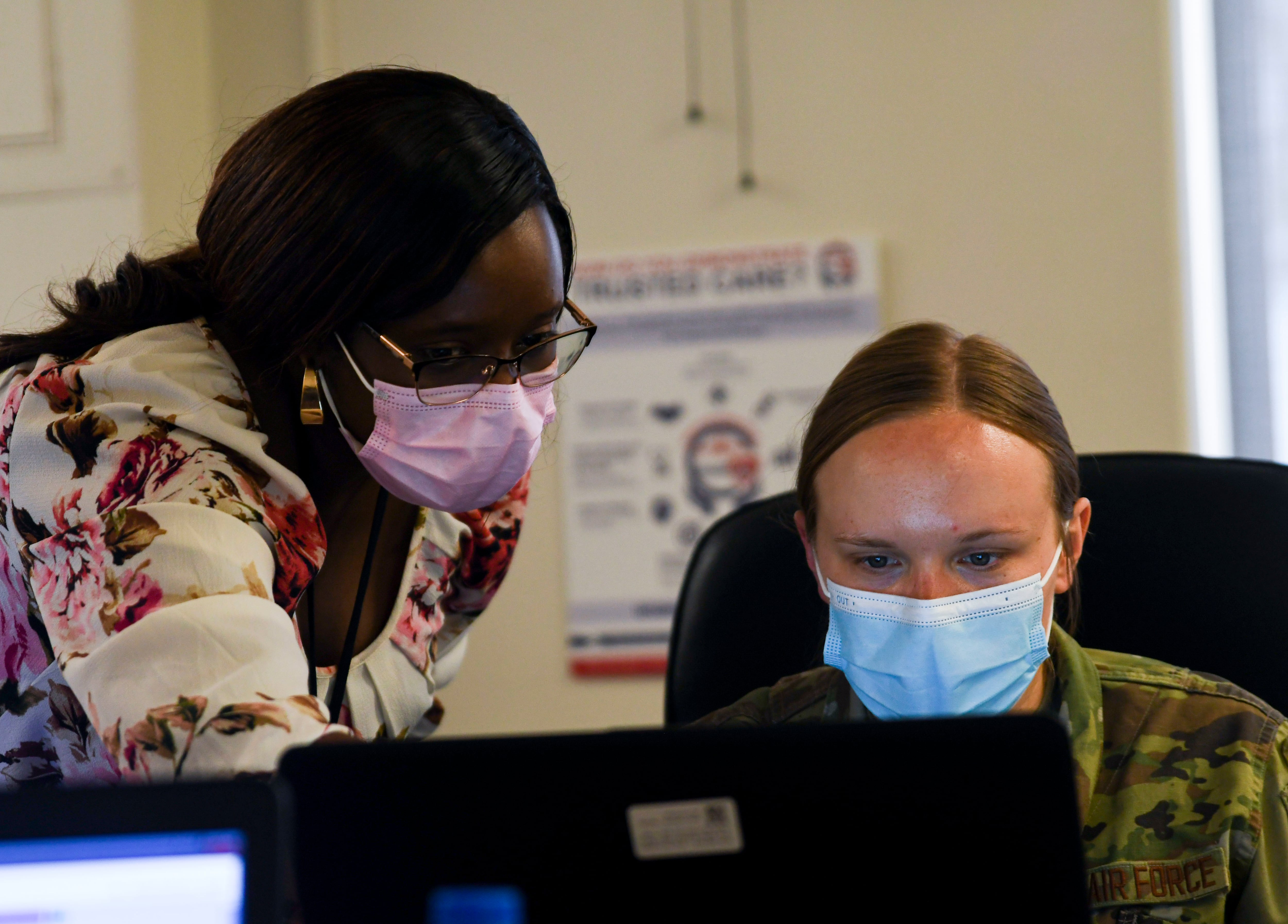An Air Force colonel sounded the alarm on what he called widespread “Machiavellian maneuvering and counterproductive bureaucracy” as he resigned from command at Brooke Army Medical Center in Texas — the military’s largest health care hub.
The hospital system at Joint Base San Antonio has a deeply ingrained toxic culture of “cronyism and sycophancy” that is “an affront to ideals of military leadership,” Col. Ken Bode, the outgoing commander of the 959th Medical Operations Squadron, wrote in a July 19 resignation letter obtained by Air Force Times.
Bode, an orthopedic spine surgeon, said he repeatedly raised problems to his chain of command but that his superiors downplayed or ignored the concerns. So he tried to make a point by quitting Tuesday, his final day on the job before his replacement took over Wednesday.
“Today I am left with this last opportunity to make a difference,” he said. “If this environment continues, we will likely see another Walter Reed Army Medical Center 2007 scandal/incident.”
His three-page complaint has spurred a joint investigation by the Army and Air Force’s inspector general and staff judge advocate offices into the facility’s processes, command relationships and past investigations.
“I am committed to a swift and comprehensive assessment of performance according to the core values, roles/responsibilities and standards in the ways they should enable optimum mission execution,” Air Education and Training Command boss Lt. Gen. Brian Robinson said in a statement emailed to Air Force Times Friday.
The Army did not respond to a request for comment. Bode declined to be interviewed.
Brooke Army Medical Center is a joint Army-Air Force organization with more than 240,000 beneficiaries in the San Antonio region. About 4,000 patients visit the its campus and six outpatient clinics each day.
The 959th Medical Group employs 1,540 airmen who work alongside more than 6,000 Army personnel at the 425-bed facility. It is the military’s only Level 1 trauma center that offers surgery around the clock as well as a wide range of specialty care, and is a key medical training site for soldiers, airmen and foreign troops.
Spurred by the 2005 Base Realignment and Closure process, the Army and Air Force took on shared responsibilities at the freshly renovated Brooke Army Medical Center a decade ago.
Service cultures clashed and egos ruled, causing friction on matters large and small, according to Bode, airmen on social media and one retired master sergeant who spoke to Air Force Times.
The Army has eschewed cooperation and common sense at every turn, starting with its refusal to adopt a joint name like “Brooke Military Medical Center” instead, Bode wrote in his resignation letter.
“The commanders and senior enlisted leaders of the Air Force component within BAMC are excluded from fundamental decision-making processes and not co-located, even after a 10-year presence in this organization,” Bode wrote.
The Army made it clear that the airmen were guests in the building, a retired master sergeant who left Brooke Army Medical Center in 2015, three years after the 959th Medical Group stood up at the joint base, told Air Force Times.
Airmen were held to Army rules that unnecessarily complicated their jobs and slowed medical procedures, the former respiratory specialist said Thursday.
RELATED

For example, the Army follows state laws that require troops to hold certain licenses to administer drugs. The Air Force holds itself to less prescriptive federal rules that qualify more airmen to handle medicine without specific licenses, the retired master sergeant said.
That means that in certain cases, airmen have to find soldiers who are certified to administer a particular medication instead of doing it themselves. In other situations, airmen are told they have to go through soldiers to speak to physicians instead of contacting the doctors directly, the former senior noncommissioned officer said.
Another gripe deals with how the facilities are laid out. A simple urinalysis takes an hour because the results are processed six miles down the road from the operating room, rather than on another floor, the retired airman told Air Force Times.
“Airmen are being told, ‘No, you can’t leave and go talk to a first sergeant. No, you can’t leave to talk to your commander,’” because they aren’t in the same building, the retired airman said.
RELATED

The former senior NCO recalled instances when Army officials allegedly neglected to tell airmen of a rape in the locker room; at least one instance when an airman faced false allegations of sexual assault as retaliation for trying to make changes; and when airmen were denied leave for at least a year during skills upgrade training, then again if their work didn’t meet Army standards rather than the Air Force’s.
“Every single day, I had somebody who was crying,” the retired senior NCO told Air Force Times. “The number of airmen and NCOs and even some of our … officers that were having suicidal ideations — I’ve had six combat tours. I haven’t seen that much suicide [on deployment] as I saw in a nine-month period of time at BAMC.”
These are systemic issues that have persisted for years, airmen said. Previous conversations, formal complaints and other resignations haven’t moved the needle.
“In each instance, leaders throughout the chain of command were aware and did nothing to stop illegal, immoral or unethical actions, which was their responsibility,” Bode wrote. “The structure and culture of JBSA/BAMC also helped undercut leaders’ ability to address the issues, which remains part of the problem.”
Bode said he filed a complaint to the 59th Medical Wing commander that he hoped would stem rampant harassment, defamation and abuse of authority.
An investigation substantiated five of Bode’s nine claims, he said, but the wing commander “dismissed the IO’s findings and substituted findings of her own that unsubstantiated all issues, unilaterally declaring that all was well.”
RELATED
Medical group superintendent kept her job after investigation found she created a toxic workplace
The military did not answer questions about multiple formal investigations mentioned in Bode’s letter.
The retired master sergeant argues that the Army and Air Force officials in charge are more concerned about self-preservation and looking good at promotion time than creating a healthy work environment for the troops under them.
Basic changes would go a long way toward fixing culture clash, the retired airman said ― like clearly defining who is allowed to do certain tasks, and settle on a single standard for training and performance.
Appoint liaisons to help the services understand each other’s norms, from performance reviews to work schedules, the airman added. And, bring Air Force leadership under the same roof as their subordinates.
The retired senior NCO has no qualms about the quality of care at Brooke Army Medical Center, noting that things run more smoothly in the trauma center and intensive care unit.
Bode added, “Inside this command, many members have and continue to provide outstanding service despite the unforgivable conditions. I cannot sufficiently express my gratitude for their commitment and my opportunity to lead them.”
Still, he cautioned others not to take leadership positions at the beleaguered center.
Airmen who believe they can reform Brooke Army Medical Center from the inside should “ask if their time and medical skills would be better spent in clinical work than wasted in command time under a system that forecloses accountability and buoys toxicity,” Bode wrote.
“We need committed, engaged commanders — that drove me to take command,” he said. “The systemic flaws I encountered, and the unwillingness of those with the power to make necessary improvements, are what drive me now to resign.”
Rachel Cohen is the editor of Air Force Times. She joined the publication as its senior reporter in March 2021. Her work has appeared in the Washington Post, the Frederick News-Post (Md.), Air and Space Forces Magazine, Inside Defense, Inside Health Policy and elsewhere.





